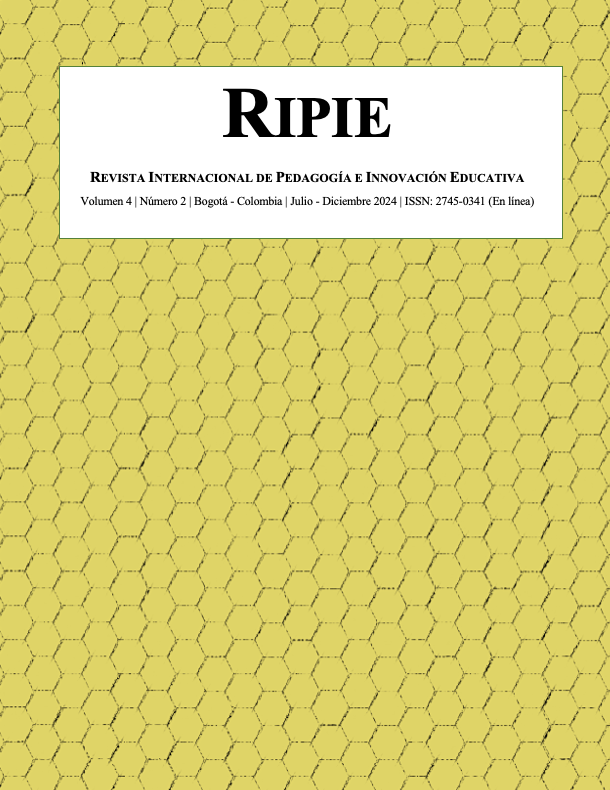The importance of reading. Brief history between didactics and pedagogy
DOI:
https://doi.org/10.51660/ripie42219Keywords:
language teaching, reading, basic learning skills, literature, school librariesAbstract
The article is introduced with a literary recreation and a brief tour of how interest in reading has been presented in recent times, until reaching the Common European Framework of Reference for Languages (CEFR) and its implications in teaching. of languages in terms of skills. In this context, we seek to explain the importance of reading in an integrated manner with the rest of the skills that make up communicative competence and what is meant by reading. Finally, some reflections are made on how to approach reading not only in the school environment, but also on the role of new libraries in the training of competent readers.
Downloads
References
Council of Europe. (2002). Marco común europeo de referencia para las lenguas: enseñanza, aprendizaje, evaluación. (C. y D. Ministerio de Educación, Ed.) (Español). Council of Europe. Disponible en http://cvc.cervantes.es/ensenanza/biblioteca_ele/marco/cvc_mer.pdf [Consultado: 04/12/2014]
Canale, M. y Swain, M. (1980). Theoretical Bases of Communicative Approaches to Second Language Teaching and Testing, Applied Linguistics, 1, pp. 1-47. Versión en español: «Fundamentos teóricos de los enfoques comunicativos», Signos, 17 (pp. 56-61) y 18 (pp. 78-91), 1996.
Cassany, D. (2021). El arte de dar clase (según un lingüista). Barcelona: Anagrama.
Conecta (2023). Hábitos de lectura y compra de libros en España 2022. Principales resultados. Disponible en: https://www.federacioneditores.org/lectura-y-compra-de-libros-2022.pdf
Cortázar, J. (2014) Rayuela. Madrid: Alfaguara. 50ª edición conmemorativa.
Hymes, D. (1972). On communicative competence. En J. B. Pride & J. Holmes (Eds.),
Sociolinguistics (pp. 269–293). Harmondsworth: Penguin.
Ina V.S. Mullis, A., Kennedy, M., Michael, Martin M.O., Sainsbury, M. (2006). Marcos teóricos y especificaciones de evaluación de PIRLS 2006. Madrid: Instituto Nacional de Evaluación y Calidad del Sistema Educativo (INECSE). Disponible en http://www.iea.nl/fileadmin/user_upload/Publications/Electronic_versions/PIRLS_2006_Framework_Spanish.pdf.
INEE. (2020). PISA 2018. Resultados de lectura en España. Madrid: Ministerio de Educación y Formación Profesional.
Ministerio de Cultura y Deporte (s.f). Plan de fomento de la lectura 2021-2024. Dirección general del Libro y Fomento de la Lectura. Disponible en https://www.culturaydeporte.gob.es/pfl-2021-2024/inicio.html
Moreno, V. (2006:11). Leer para comprender. Gobierno de Navarra.
Petit, M. (2009). El arte de la lectura en tiempos de crisis. Barcelona: Océano S.L.
Petrucci, A. (2001). Leer por leer: un porvenir para la lectura. En Cavallo, G. &. Chartier, R. Historia de la lectura en el mundo occidental. Madrid: Taurus-Minor.
Real Decreto 157/2022, de 01 de marzo, por el que se establecen la ordenación y las enseñanzas mínimas de la Educación Primaria. BOE de 02 de marzo.
Recomendación 2006/962/CE del Parlamento Europeo y del Consejo, de 18 de diciembre de 2006, sobre las competencias clave para el aprendizaje permanente [Diario Oficial L 394 de 30.12.2006]. Disponible en http://eur-lex.europa.eu/legal-content/ES/TXT/HTML/?uri=URISERV:c11090&from=EN
Rychen. D.S., Salganik L.H. Defining and selecting key competencies. Executive Summary. Informe DeSeCo. Definición y Selección de Competencias. OCDE. Disponible en http://www.oecd.org/dataoecd/47/61/35070367.pdf
Stern, H. H. (1983). Fundamental concepts of language teaching. Oxford: Oxford University Press
Tolstoi, L. N. Relatos de Sevastópol. Barcelona: Alba editorial. 2013
UNESCO (2022). IFLA-UNESCO Public Library Manifesto. Disponible en https://unesdoc.unesco.org/ark:/48223/pf0000385149
Vallejo, I. (2020). Manifiesto por la lectura. Madrid: Siruela
Vallejo, I. (2019). El infinito en un junco. Madrid: Siruela
Widdowson, H. G. (1990). Aspects of Language Teaching. Oxford: Oxford University Press.
Downloads
Published
Issue
Section
License
Copyright (c) 2024 Revista Internacional de Pedagogía e Innovación Educativa

This work is licensed under a Creative Commons Attribution-NonCommercial-ShareAlike 4.0 International License.
Articles are published under the terms of a licence that permits use, distribution and reproduction in any medium, provided that the original work is properly cited. Ed&TIC retains the proprietary rights to the published works and actively promotes the reuse of these works under the terms of the aforementioned licence, which encourages the dissemination of knowledge and collaboration in the academic community.


